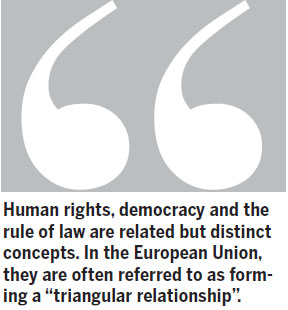Opposition has no excuse to harm the rule of law
Updated: 2014-11-26 07:44
By Lau Nai-keung(HK Edition)
|
|||||||
Theme 2 of the Liberal Studies curriculum in Hong Kong is the "rule of law and socio-political participation". Students are asked "how do Hong Kong residents participate in political and social affairs and come to grips with rights and responsibilities with respect to the rule of law?" Social and political participation almost sounds like a code word for political activism. So we must ask the obvious: Why is the Liberal Studies curriculum associating the concept of rule of law with "socio-political participation"? Why is it making it sound as if "socio-political participation" is the primary means through which we "come to grips with rights and responsibilities with respect to the rule of law"?
Most inquiries on the subject begin with British jurist A. V. Dicey (1835-1922), who is thought to have popularized the term "rule of law" in the 19th century. Dicey believed there were three principles to the rule of law. The first is that no man is punishable or can be lawfully made to suffer in body or in goods - except for a distinct breach of law established in the ordinary legal manner before ordinary courts. The second is equality before the law, or the equal subjection of all classes to the ordinary law administered by ordinary law courts. The third principle is that in England the law of the constitution is the result, not the source, of the rights of individuals.
These concepts are not concerned directly with "socio-political participation", although they definitely have an impact on our rights to such activities. In fact, Dicey's third principle is often criticized as giving no substantive human rights to his idea of the concept of the rule of law. Dicey reasoned that there was no need for a bill of rights. This was because the general principle of the constitution was the result of judicial decisions determining the rights of the private person. The courts protect them in their decisions by developing the common law in such a way as to respect the liberty of the individual.

In recent years, Lord Thomas Bingham has been considered the leading authority on the concept of the rule of law. His definition is considered "entirely authoritative and will probably remain so for the next 120 years or more". In summary, his definition is "that all persons and authorities within the state, whether public or private, should be bound by and entitled to the benefit of laws publicly made, taking effect (generally) in the future and publicly administered in the courts." Again, this has nothing directly to do with "socio-political participation."
Bingham expands his definition into eight sub-rules or principles, the fourth of which is that "the law must afford adequate protection of fundamental human rights". Unlike the arrogant dissidents here in Hong Kong, Bingham conceded that human rights "would not be universally accepted as embraced within the rule of law," and approvingly cited Sir Jeffrey Jowell's deliberation that the rule of law "does not, for example, address the full range of freedoms protected by bills of rights in other countries or in international instruments of human rights, or those now protected by our recently enacted Human Rights Act 1998, as set out in the European Convention on Human Rights (such as the right not to suffer torture, or the right to freedom of expression or rights of privacy or sexual freedom)."
When referring to Lord Bingham or other British legal authorities, as our dissidents like to do, we should be reminded that the situation in Hong Kong is relevant only to the extent that most of our local legislation is a colonial legacy and we are still practicing a British-style legal system. However, the concept of parliamentary sovereignty, which is the foundation of Dicey's concept of the rule of law, is alien to our legal system. At the same time, while the United Kingdom has an unwritten constitution, we have a written document - the Basic Law.
Human rights, democracy and the rule of law are related but distinct concepts. In the European Union, they are often referred to as forming a "triangular relationship". Lord Bingham has made it clear that the rule of law only protects fundamental human rights, not the full range of freedoms or high-sounding ideals found in international declarations or treaties. Our dissidents' argument that somehow our rule of law is bogus because we do not as yet have universal suffrage for the election of the Chief Executive (while advocating public nomination, or "international standards") is not valid. They have no excuse whatsoever to damage the rule of law that most of us treasure.
The author is a veteran current affairs commentator.

(HK Edition 11/26/2014 page10)